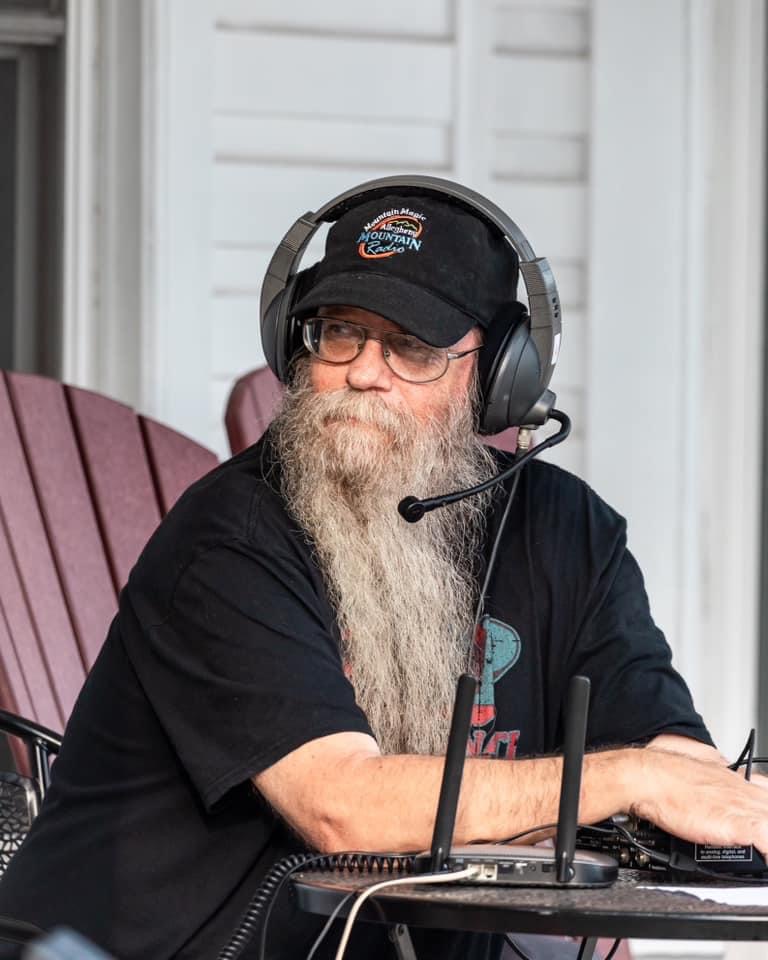When the derecho of June 2012 crashed into the Mid-Atlantic, downing trees and knocking out electricity and cellphone service for millions of people, Allegheny Mountain Radio stayed on the air.

With backup generators, the cooperative of three community radio stations in Dunsmore, West Virginia, and Bath and Highland counties in Virginia provided updates on cooling stations, available water and other emergency needs during the subsequent sweltering heat wave, said general manager Scott Smith.
“As long as you had a radio that you could play off of a battery, whether it be in your house or go out to your car and listen, we were still out there giving all that information,” Smith said.
Smith told the story as an example of how he believes community public radio remains valuable in the digital age, especially in a mountainous region where cellphone service is scarce on the best days and some people don’t have internet access.
Now Allegheny Mountain Radio is tackling a different crisis: the loss of about $300,000 in annual funding, which is about 60% of its approximately $500,000 yearly budget.
The rest of its budget comes from individual donors and support from businesses, churches and civic groups. Most of Allegheny Mountain Radio’s donations are smaller gifts that come during its spring and fall fundraising weeks, Smith said.
Last week, as part of an effort to defund PBS and NPR, Congress passed a bill to rescind $1.1 billion over two years that already was appropriated for the nonprofit Corporation for Public Broadcasting. The bill also clawed back more than $7 billion in foreign aid.
CPB distributes federal funding to PBS, NPR and more than 1,500 public radio and TV stations. Nearly half of the organizations it supports are considered rural.
President Donald Trump, who on Friday received the bill to rescind funding, has said news coverage from PBS and NPR is biased and that their taxpayer subsidies are “outdated and unnecessary.”
“Unlike in 1967, when the CPB was established, today the media landscape is filled with abundant, diverse, and innovative news options,” Trump said in a May 1 executive order calling for the end of CPB funding.
With the bill’s passage, public radio and TV stations, both big and small, are feeling the impact.
Nearly half of the rural organizations that have been supported by CPB rely on federal funding for at least a quarter of their budget. But few are seeing such a large share of their budgets eliminated as Allegheny Mountain Radio.
Allegheny Mountain Radio runs 40 minutes of top-of-the-hour NPR newscasts each day and some short features, but it’s not an NPR member station. Most of its programming is locally produced.
Its West Virginia station first went on the air in 1981, and the Virginia stations came online in 1996, Smith said. Today, it has six full-time and five part-time employees.
Paid staff manage programs timed to morning and afternoon commutes as well as a noon news segment. The rest of the airtime is handled by volunteer DJs who play pretty much anything they want, Smith said.
“We can go very easily from bluegrass to dance music to reggae to good old country,” he said.
Although Allegheny Mountain Radio has its own style, its mix of music, news and local information such as school closures and notices of lost pets is similar to the playbook followed by community radio stations across the country.
With the loss of CPB funding, Allegheny Mountain Radio is fortunate to have financial reserves that it can draw upon, Smith said.
He declined to estimate how long those savings would last, saying it depends on multiple unpredictable factors, but said the station does not anticipate staffing or programming changes “for the foreseeable future.”
“Obviously when you are operating a budget that’s in the red and you are drawing on your reserves, that is a finite resource that’s going to run out in time,” he said.
Meanwhile, the radio group will try to strengthen its income streams and tighten its belt without jeopardizing its core mission, Smith said.
Nonetheless, he said, Allegheny Mountain Radio has likely already approached most of the businesses in its area about underwriting the station, and even loyal donors have limits.
“We have a very large base of support and people that give to support us, but they can only give so much,” Smith said. “Now they give what they can and it can’t be reasonably expected for them to just open up their pocketbooks and give money they don’t have to us.” 
‘Possum Club’ helps keep Appalshop station on the air
Similar to Smith’s account of providing public service during the 2012 derecho, Roger May can point to the July 2022 flooding that devastated eastern Kentucky.
May is director of artistic programs for Appalshop, an arts nonprofit that owns the community radio station WMMT. The station is based in Whitesburg, Kentucky, and broadcasts into Southwest Virginia with frequencies in Big Stone Gap and Norton.
Proudly touting the nickname “possum radio,” WMMT “broadcasts mountain people’s music, culture, and social issues as no other station could,” according to its website. It celebrates its 40th anniversary this year and recently moved into a new studio.
The July 2022 storms knocked the station offline for a while, May said, but it eventually came back on as a critical vehicle to provide listeners with information about water, hot meals and cleaning supplies.
It also provided “a little bit of normalcy to the community” during that trying time, he said.
“If they want to, on a Thursday evening at 6 o’ clock, turn the radio on and hear ‘Mountain Talk’” — one of the station’s more popular programs — “and take a break from mucking out their home or helping move supplies around the region — just something to connect them to the pre-flood time when things were not as hectic as they were then,” May said.
WMMT typically received about $132,000 annually from the Corporation for Public Broadcasting, which is about one-third of its approximately $400,000 yearly budget. It’s also supported by donors, underwriting and contributions from smaller foundations, with the foundations making up the largest share of those three categories.
It has one full-time employee. May is serving as temporary general manager as the station works to hire a new one.
It leans on an “incredible network” of volunteer DJs to play not just traditional mountain music but also hip-hop, punk and folk music, May said.
May said he doesn’t foresee programming impacts “at the moment” because of the loss of CPB funds. Appalshop has a development team crafting a long-term strategy to connect with more funders and encourage donations from supporters, whose monthly pledges earn them membership in the “Possum Club.”
“We’re not going anywhere,” May said. “We’ve been at this for 40 years in a range of funding landscapes and we intend to be around for a lot longer because we know that people care about our programming.”
Smith, of Allegheny Mountain Radio, voiced a similar sentiment.
“We’re still here, and we’re going to keep doing exactly what we’ve been doing for absolutely as long as we can until we can’t do it anymore,” he said.



